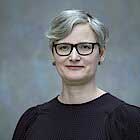Failing to Collect Data About Women is no Trivial Offence

BERLIN, Mar 17 (IPS) - Women get freezing cold in trains and in big city offices because the air conditioning is set for men’s sensitivity to the cold. They spend the whole theatre interval (when visits to the theatre were still possible) in the queue because there are too few toilets.
What may appear to be more of a nuisance – a lack of public toilets for women – is a life-threatening problem in many countries in the world. In some federal states in India, women have no access to toilets and fritter away valuable time looking for a safe place. If they don’t find it, they are often sexually harassed or even killed.
City authorities don’t record these special needs, and they are therefore not taken into account. But the problem is broader. In a large number of areas, data is not collected by gender. That’s true for example in medical research, which is mostly geared towards men for convenience’s sake.
It’s also true in traffic planning, giving preference to cars that are overwhelmingly used by men, although the majority of women globally travel by foot or by bicycle. In winter, it’s first the streets that are cleared although most accidents take place on pavements.
In her book Invisible Women: Exposing Data Bias in a World Designed for Men, the British author and feminist Caroline Criado-Perez has collected such facts and data from all areas of life, cultures and parts of the earth on just 500 pages.

Criado-Perez shows the huge gaps in data to the detriment of women in the workplace, in the design of basic commodities, in medicine and in public life. The ubiquitous discrimination of women is underscored with sobering figures.
And they prove what we have only presumed up until now: the world is not only partly but almost exclusively geared to men’s needs. She calls it ‘one-size-fits men’.
When data bias becomes life-threatening
The fact that the data gaps are so grave is also because we live in the digital age. Data is the new gold. With data, people can earn a lot of money and some base far-reaching decisions on it every day. That’s why it makes a huge difference whether data is taken from men or from women for an algorithm and with which data artificial intelligence is fed.
Criado-Perez comes up with the example of job-related assessment tests: Men always got the job if applications were only evaluated by artificial intelligence because both the questions and the answers referred to male views of life.
Another example: when the New York Philharmonic Orchestra introduced an anonymous musical test, the number of female musicians rose from 0 to 45 per cent. The same phenomenon can be observed in the evaluation process for scientific essays: If neither authors nor evaluators are known, then more essays come in from female academics and receive a higher mark.
If there’s a will, there's a rather simple way: it doesn’t cost more money to collect data from women and about women to include them in the decision-making.
In the health sector too, women are mostly overlooked. For example, they are often given the wrong treatment when they have a heart attack because they often show ‘untypical’, i.e. non-male symptoms. Women are 17 per cent more likely to die in a car accident than men. Why?
Because it’s almost exclusively male dolls that are used in crash tests. Agricultural equipment and machines are only designed for men. Men are usually taller, have bigger hands and more strength.
Women, who use equipment or machines that are not suited for them on a daily basis, have health problems and are more likely to have accidents. Men are the measurement for all things. Or why, for an evening meal, are the costs for the food and the hotel allowed as expenses but the travel and babysitting costs are not? Criado-Perez has collected a huge number of similar examples.
A few successes
The good news is that this can be changed. If there’s a will, there's a rather simple way: it doesn’t cost more money to collect data from women and about women to include them in the decision-making.
It doesn’t cost more money to take female instead of male test subjects for research. In many areas it would make economic sense to take women more into account. If infrastructure and research are geared more towards women, this does not only lead to women being treated equally but also leads to cost savings. As cost savings are highly valued in our capitalist world, this transition becomes more likely.
But for this to happen, many voices need to come together and demand the ‘gender data gap’ to be closed. Perhaps that includes those men who have read the entertainingly written book and have been persuaded that their view of the world is not the only right one.
The author has even had a few (rather symbolic) successes: Thanks to her perseverance, an image of Jane Austen can now be found on the British 10 pound note. Alongside the image of the Queen, she is the only woman on a British note. It’s also down to Criado-Perez that the statue of a female lawyer stands on Parliament Square in London next to many hundreds of male statues.
*Anja Papenfuss was previously head of FES's Press Department, and before that, she worked as a policy officer in its political analysis unit. She edited the German-language sister magazine, Internationale Politik und Gesellschaft. She studied political science in Bonn and Berlin.
Source: Friedrich-Ebert-Stiftung (FES), Berlin
Follow @IPSNewsUNBureau
Follow IPS News UN Bureau on Instagram
© Inter Press Service (2021) — All Rights Reserved. Original source: Inter Press Service

